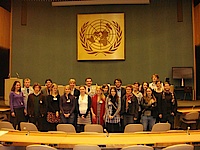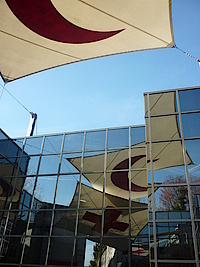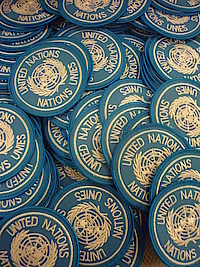Study Trips
Study Trip to Geneva 2010
First on the program was a visit to the United Nations Development Programme (UNDP). In an interview with expert Gunnar Berkemeier (Programme Analyst fur Rule of Law, Justice and Security, Bureau for Crisis Prevention & Recovery), the group was able gain insight into the practical work of the UNDP.
In the afternoon, students visited the World Trade Organization (WTO) where an intense discussion took place with Dickson Yeboah (Counsellor, Institute for Training and Technical Cooperation) on the implications of WTO activities in the field of international trade and trade liberalization in less-developed countries.
In the evening, the group attended a lecture on "The Regime Complex for Climate Change" by Professor Robert Keohane at the Graduate Institute of International and Development Studies.
The following day included a visit to the UN. After a tour of the Palais des Nations, the group was able to talk with experts from the World Health Organization (WHO), the High Commissioner for Refugees (UNHCR), the Conference on Disarmament, and the Office for the Coordination of Humanitarian Affairs (OCHA).
On the third day, the students first visited the International Committee of the Red Cross (ICRC). In conversations with Maurizio Geremia (Head of Sector, Unit for Relations with Arms Carriers) and Dr. Robin Geiss (Legal Advisor), they were introduced to the objectives and difficulties in humanitarian work.
After that, there was a visit to Oxfam where, in an interview with Aimee Ansaari (Humanitarian Policy Advisor), the group learned more about that NGO’s practical work and organization.
The final meeting of the day was at the Small Arms Survey. Here the students had access to three experts: Luigi Di Martino (Geneva Declaration Project Coordinator), Glenn McDonald (Senior Researcher) and Matthias Félix Nowak (Research Assistant) presented their scientific research while showing how the uncontrolled proliferation of so-called "small arms" and "light weapons" represents an enormous threat to human security.
On the way back to Konstanz, the group made a stop in Bern. There students visited the German Embassy where they were received by Defence Attaché Rainer L. Konrad.
As the result of these visits to institutions in Geneva, students gained insight into the real work of various players active in (post-)conflict and crisis regions. It became clear to them how complex and problematic UN interventions to guarantee human security actually are. The question of how humanitarian aid should be arranged and coordinated was time and again the focus of discussions. For the students, it was especially valuable that the experts not only made general presentations but were also willing to enter into discussion with them. The resulting situation was very similar to a real interview with an expert. The students thus had the opportunity to direct these discussions based on knowledge acquired during their studies, thus enabling them to deepen their own inquiries in research work such as masters theses.


